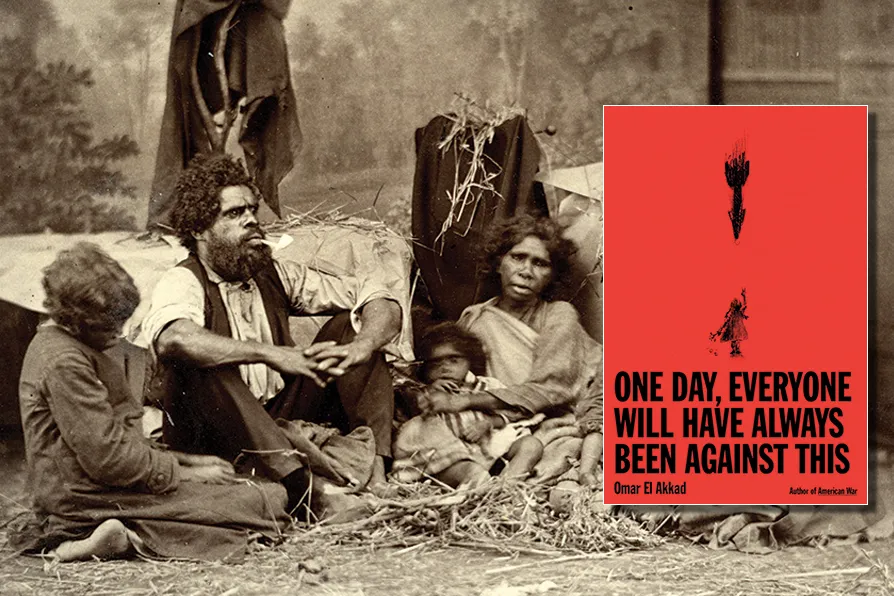TONY BURKE speaks to Gambian kora player SUNTOU SUSSO
ALEX HALL welcomes a book about Gaza that recognises how imperial capitalism defines groups of people by their non-existence

 FOR TOURISTS TO GAWK: Studio portrait of an Aboriginal family, Charles Bayliss c1880. His photographs of Aboriginal people were part of a flourishing trade, characteristic of the twinned projects of colonialism and modernism. [Pic: bmcc.nsw.gov.au/CC]
FOR TOURISTS TO GAWK: Studio portrait of an Aboriginal family, Charles Bayliss c1880. His photographs of Aboriginal people were part of a flourishing trade, characteristic of the twinned projects of colonialism and modernism. [Pic: bmcc.nsw.gov.au/CC]
One day, everyone will have always been against this
Omar El Akkad, Canongate, £16.99
POLITICS used to make one indignant. Angry, even. Emotional reactions to clear injustices prompt multiple practical push backs. Most of these are straightforward: grasp the subject in detail, understand the background and context, work out how things must change.
Politics today prompt moments away from the world. Day to day life is heavy. The world and people we thought we knew are simply not what we spent all our lives believing. Some call it cognitive dissonance. For many more it means just finding yourself weeping while going about what you thought was a “normal” life. For yet others, it means you’ve actually seen the world as it is.
This is a book about Gaza. Not the slaughter, although that is addressed, but how it has fundamentally fractured something in the West.
The situation is so disorientating its a struggle to find the right words. But Omar El Akkad is able to start to provide some grounding, and starts with the colonial experience of the colonised.
El Akkad was born in Cairo, moved to Qatar with his father’s work, as a teenager found himself in Canada and is now lives in the US. He details the humiliations his father had to face in both Egypt and in the West, his own experiences as an Arab, a Muslim and a Canadian, and the expectations that he encounters: he looks one part, but sounds another. He’s expected to be grateful, to understand that the civilised world only does what is necessary, that history’s starting points can be shifted so that one side always instigates.
Once enough time has passed the resistance will be venerated. Once the land is stolen and the natives dead everyone will agree it was wrong. An indigenous affirmation at a book event will acknowledge the displaced owners of the land and thank the hedge fund for sponsoring the event. Imperial capitalism defines groups of people by their non-existence, whether they be migrant workers in Doha, the Algonquin in Ottowa or Palestinians in Palestine.
This provides something of a cognitive basis for the experience of bearing witness to the ceaseless atrocities and injustices that have flooded our screens. It is the experience of the colonised, and to see our political leaders respond without a shred of humanity, with a moral vacuity and only able to take the prompts of power, is precisely a colonised experience.
That is why in the US people with a moral compass were urged to vote for the lesser evil of the Democrats because the Republicans would be so much worse. Much the same choice was presented to the UK electorate. But the problem is that once the greater evil has been prevented from taking power there is no incentive to change anything. Many simply will not vote when presented with these choices. They are then berated with allowing the evil right wing to win. But as El Akkad points out: “How empty does your message have to be for a deranged right wing to even have a chance of winning?”
But we cannot abandon hope. Change requires one to participate in change. There have been multiple moments of courage, of solidarity, of bravery. Western elites did not change overnight but now we do see them as they really are. El Ekkad’s work is a vital reflection of the West to itself. The West is in the process of rupture, of decay from within, as its systems strip back everything from everyone but the richest.
El Akkad’s work is not a catharsis and the injustices are ongoing. But it has a startling coherence, and is written with the force of poetry.

Looking for moral co-ordinates after a tough year for rational political thinking and shared human morality

Looking for moral co-ordinates after a tough year for rational political thinking and shared human morality

How can we claim to be human while our countries still support and defend the massacres in Palestine, asks HUGH LANNING











